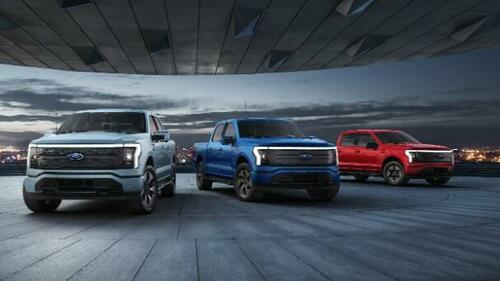
The trend of legacy automakers ditching their plans and investments in EVs continues, with Ford reportedly the latest to cancel plans for a large three-row electric sport-utility vehicle, according to a new report from the Wall Street Journal.
The company will take $1.9 billion in related special charges and write-downs as a result, the report said.
Ford is canceling due to pricing pressures and increased competition, instead opting to focus on hybrid versions of its popular Explorer and Expedition models.
This decision reflects a broader trend among automakers that we have written about over the last year or two, especially since the UAW extorted negotiated their latest labor contracts from the Detroit automakers.
Additionally, consumer demand has been weaker than anticipated, with concerns over cost and charging infrastructure. As a result of all of these factors, combined with increased competition out of China, legacy automakers are scaling back EV investments. VW also announced it was stepping back from EVs to focus on hybrids earlier this year, as we wrote in May.
Ford Chief Financial Officer John Lawler commented: “Based on where the market is and where the customer is, we will pivot and adjust and make those tough decisions.”
The WSJ reported on Tuesday that Ford has also delayed the launch of a new electric pickup truck to 2027, marking the second postponement, and reduced its EV investment to 30% of its budget, down from 40%.
The company expects to lose $5 billion on its EV business this year, with a loss of about $44,000 per vehicle in the second quarter. Executives are focused on reducing losses and ensuring future EVs are profitable.
Despite recalibrating plans to include more hybrids, Ford is still moving forward with several full EVs, including an electric commercial van in 2026 and two new pickup trucks in 2027, according to the report.
Farley said last month: “We believe that the fitness of the Chinese in EVs will eventually wash over our entire industry in all regions.”
We wrote back in June that nearly half of EV drivers in the U.S. were considering switching back to gas. Forty-six percent of EV owners surveyed in the United States say they will likely return to driving gas-powered vehicles.
Globally, the survey of 30,000 respondents in 15 countries found that more than one-quarter (29 percent) of EV owners are likely to go back to driving gas-powered cars.
Recall back in April we noted that Ford was "re-timing" its efforts to go all electric and back in February we wrote that GM was shifting to plug-in hybrids, too.
CEO Mary Barra said on an earnings call back in February: “Let me be clear, GM remains committed to eliminating tailpipe emissions from our light-duty vehicles by 2035, but, in the interim, deploying plug-in technology in strategic segments will deliver some of the environment or environmental benefits of EVs as the nation continues to build this charging infrastructure.”
The trend of legacy automakers ditching their plans and investments in EVs continues, with Ford reportedly the latest to cancel plans for a large three-row electric sport-utility vehicle, according to a new report from the Wall Street Journal.
The company will take $1.9 billion in related special charges and write-downs as a result, the report said.
Ford is canceling due to pricing pressures and increased competition, instead opting to focus on hybrid versions of its popular Explorer and Expedition models.
This decision reflects a broader trend among automakers that we have written about over the last year or two, especially since the UAW extorted negotiated their latest labor contracts from the Detroit automakers.
Additionally, consumer demand has been weaker than anticipated, with concerns over cost and charging infrastructure. As a result of all of these factors, combined with increased competition out of China, legacy automakers are scaling back EV investments. VW also announced it was stepping back from EVs to focus on hybrids earlier this year, as we wrote in May.
Ford Chief Financial Officer John Lawler commented: “Based on where the market is and where the customer is, we will pivot and adjust and make those tough decisions.”
The WSJ reported on Tuesday that Ford has also delayed the launch of a new electric pickup truck to 2027, marking the second postponement, and reduced its EV investment to 30% of its budget, down from 40%.
The company expects to lose $5 billion on its EV business this year, with a loss of about $44,000 per vehicle in the second quarter. Executives are focused on reducing losses and ensuring future EVs are profitable.
Despite recalibrating plans to include more hybrids, Ford is still moving forward with several full EVs, including an electric commercial van in 2026 and two new pickup trucks in 2027, according to the report.
Farley said last month: “We believe that the fitness of the Chinese in EVs will eventually wash over our entire industry in all regions.”
We wrote back in June that nearly half of EV drivers in the U.S. were considering switching back to gas. Forty-six percent of EV owners surveyed in the United States say they will likely return to driving gas-powered vehicles.
Globally, the survey of 30,000 respondents in 15 countries found that more than one-quarter (29 percent) of EV owners are likely to go back to driving gas-powered cars.
Recall back in April we noted that Ford was “re-timing” its efforts to go all electric and back in February we wrote that GM was shifting to plug-in hybrids, too.
CEO Mary Barra said on an earnings call back in February: “Let me be clear, GM remains committed to eliminating tailpipe emissions from our light-duty vehicles by 2035, but, in the interim, deploying plug-in technology in strategic segments will deliver some of the environment or environmental benefits of EVs as the nation continues to build this charging infrastructure.”
Loading…




